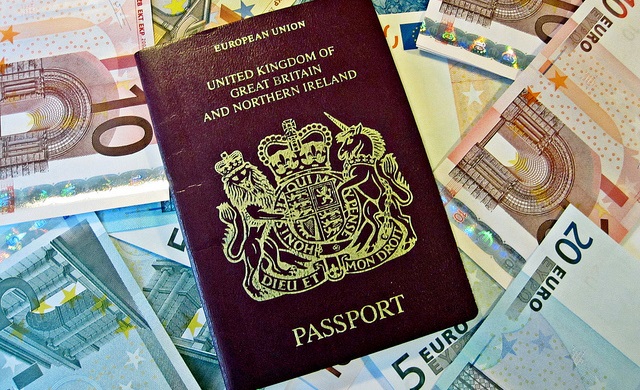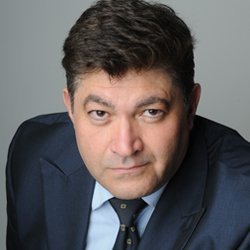When going abroad, whether on holiday or for business, you will inevitably need cash. Travellers cheques are a faff, credit cards aren’t always accepted and carry charges, but cold hard cash is a language spoken internationally. So, should you get some foreign currency before you set off or should you wait until you get to where you’re going?

First things first, check the base exchange rate online. Sites like ADVFN have currency converter pages that show you what you would get for your buck in an ideal world by using the international forex markets to show you the best price for whatever currencies you want to convert.
However, be aware that wherever you go to get your holiday cash you will be hard pushed to get a rate quite that good. Currency exchange companies will invariably charge you a fee for converting currencies, will have widened spreads (more on that below), or both.
Fees
When changing one currency to another (pounds to euros, dollars to pounds etc) the company making the exchange for you will sometimes (but not always) charge you a fee. This could be a flat rate, or it could be % of the amount you’re exchanging. When deciding where to change your cash the temptation is to look only at companies who charge no fee at all, but this is not always the right thing to do. Some companies who charge no fees at all will get you with the widened spreads I mentioned earlier on. So what are spreads?
Spreads
When you’ve been into a bureau de change previously you’ve probably noticed the big board they have above the desk. Generally it has a load of currencies on it and red digital numbers giving prices to buy a currency and prices to sell. The gap in between these prices is called the spread.
This spread varies wildly from company to company as it is not something set in stone by some international regulatory body. Try to find the company offering the smallest spread you can, as it can make a big difference to how much money you get for your, er, money.
Put simply, exchange companies make more money by offering wider spreads.
For instance, the exchange rate for pounds to dollars (which you can check here) might be $1.60. One company might offer to buy US dollars at $1.50 and sell them at $1.70. That a spread of 20 cents.
Another company might offer to buy US dollars at $1.55 and sell them at $1.65, closer to the actual base exchange rate, a spread of 10 cents.
A smaller spread gives you better value for money and means you end up with more cash to spend so look for currency exchanges with narrow spreads, basically buy and sell prices that are as close together as possible.
Home or Away?
One thing is for certain – don’t plan to get cash at the airport. Bureau de change desks at the airport tend to charge higher fees or have wider spreads than you’ll get elsewhere. They are relying on the convenience of their location and for you to panic that you’ll be stranded in a foreign land with no wonga in your pocket. Plan ahead and whatever you do, don’t panic.
The truth about whether to get currency at home or abroad is that it depends on where you are. If you’re in the US travelling to the UK the answer is necessarily different than if you are in the UK planning to travel to the US. In an article like this I can’t tell you where to get your cash with greater than 50/50 likelihood of being correct, nobody can.
Whenever you go abroad put an alarm on your phone’s calendar a week beforehand reminding you to do some research into exchange rates. Have a look online at the rates offered by bureaux de change and currency exchanges both at home and where you’re headed. Most places stock dollars, euros and pounds, but may need to order in other currencies, so make sure to check early.
Work out how much cash you’re likely to need then do a little bit of junior school maths.
Use your brain
Maybe it’s been a while since you did any maths. Maybe the mere mention of it gives you palpitations. Just remember that this bit of maths could save you a bundle of money. Also, if you want to use a calculator you won’t be accused of cheating by anyone. Take a deep breath and apply this simple formula:
(Amount of money you want to convert x Exchange rate) – Fee
Easy peasy.
So, imagine you live in the UK and are off to the USA and need £2,000 spending money. You do a bit of research and come up with 3 currency exchanges you like the look of, 1 at home and 2 abroad.
Exchange 1 : Fee £50 : Buy rate $1.65
Exchange 2 : Fee £10 : Buy rate $1.64
Exchange 3 : Fee £0 : Buy Rate $1.61
Break out the calculator app on your phone or grab a pencil and apply the simple formula above to each set of figures:
Exchange 1 : (2,000 x 1.65) – 50 = $3,250
Exchange 2 : (2,000 x 1.64) – 10 = $3,270
Exchange 3 : (2000 x 1.61) – 0 = $3,220
So, in this case, the best guys to use are Exchange 2, even though Exchange 1 has a better rate and Exchange 3 has no fees. Maths isn’t scary, it saves you money!


 Hot Features
Hot Features













